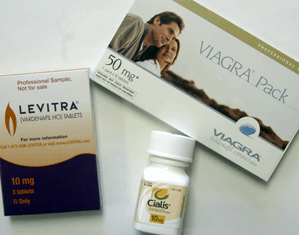 Signaling a growing concern over the misuse of erectile dysfunction drugs by gay men, federal health officials met in late September to focus on education efforts surrounding the drugs and their possible link to increased HIV infections through high-risk sex.
Signaling a growing concern over the misuse of erectile dysfunction drugs by gay men, federal health officials met in late September to focus on education efforts surrounding the drugs and their possible link to increased HIV infections through high-risk sex.What came from the discussion over Cialis, Levitra and Viagra — the three drugs on the market used to treat erectile dysfunction, also referred to as PED5 inhibitors — is that there appears to be a link between the drugs and substance abuse among gay men.
“What’s unclear is if the substance abuse comes first, or after taking impotence drugs,” said David Purcell, a senior behavioral scientist from the Centers for Disease Control & Prevention who attended the Sept. 26-27 summit in Potomac, Md.
“We can’t say because the information we have comes from studies done for another reason and stumbled onto the erectile dysfunction issue,” he added.
Purcell said the general consensus among conference attendees was to undertake studies that follow patients over an extended period of time. Current data comes from researching a population at a particular time.
The conference, organized by the National Institute of Mental Health, included officials from the Food & Drug Administration, the Centers for Disease Control & Prevention and the National Institute on Drug Abuse.
Representatives from the makers of the three erectile dysfunction drugs also attended.
Jeff Klausner, director of the STD/HIV prevention unit of the San Francisco Department of Public Health, said experts at the meeting agreed that more data was needed to establish “the how and why of PED5 in MSM.”
Gay men taking impotence drugs fall into two categories, according to Klausner: HIV-positive people who use the drug to combat the effects of antiviral medications, and substance abusers who take the drug to maintain an erection.
Both groups need to be addressed, he said.
“We discussed clinical guidelines for the use of PDE5s in persons with HIV infection to assure that the whole patient is being addressed, and that patients are properly assessed for other conditions that may lead to impotence,” said Klausner, who attended the conference. “We also feel a comprehensive sexual history should be taken, proper STD screening performed, including gonorrhea and chlamydia screening of the throat, penis and anus, and if appropriate, based on sexual behavior, syphilis testing and herpes testing,” he added.

Several years ago Klausner unsuccessfully petitioned the FDA to warn consumers that use of anti-impotence drugs like Viagra may increase the risk of sexually transmitted disease and HIV.
“The label information is adequate because the science does not indicate a causal relationship of PDE5 inhibitors and STDs,” Susan Cruzan, an FDA spokesperson, said this week.
Cruzan declined to comment further on the September conference.
The drug companies said education about proper use of the drugs is critical and that high-risk sex, not the drugs, is feeding increases in some sexually transmitted diseases.
“Pfizer believes a medical diagnosis and physician supervision are critical to the appropriate use of Viagra and other PDE5 inhibitors,” said Daniel Watts, a spokesperson for Pfizer, which produces Viagra.
“There is no scientific evidence that PDE5 inhibitor medicines increase the rate of STDs, as noted during the conference. Rather, there are multiple factors at work, including high-risk sexual practices such as unprotected anal sex, sex with multiple partners and the use of recreational drugs, particularly methamphetamine,” he added.
Pfizer produced a series of brochures aimed at educating health care providers and patients about Viagra, Watts said.
The company also is funding the development of sexualsmarts.org, a resource site for healthcare professionals about prevention and treatment of STDs, he added. Spokespersons for Eli Lilly & Company, which manufactures Cialis, and Bayer Pharmaceuticals and GlaxoSmithKline,which produces Levitra, said that their literature includes warnings against using the drugs for other than their prescribed purposes.
The jury is still out on the role of impotence drugs in spreading HIV, according to Noel Alicea, a spokesperson for the Gay Men’s Health Crisis in New York.
“We’ve heard about it, but there’s not really that much information available,” Alicea said. “However, we do feel that the drug companies should take on more responsibility to promote safer sex.”
from Southern Voice

No comments:
Post a Comment